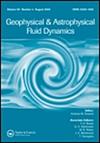The interaction of a mode-1 internal solitary wave with a step and the generation of mode-2 waves
IF 1.1
4区 地球科学
Q3 ASTRONOMY & ASTROPHYSICS
Geophysical and Astrophysical Fluid Dynamics
Pub Date : 2019-07-04
DOI:10.1080/03091929.2019.1636046
引用次数: 6
Abstract
ABSTRACT In this study, we examine the transformation of a mode-1 internal solitary wave incident on a bottom step, and the consequent generation of mode-2 internal solitary waves. A linear long-wave theory of mode coupling in the vicinity of the step is used to estimate the mode-1 and mode-2 wave reflection and transmission coefficients, and hence the energy fluxes. Away from the step, the wave evolution of the transmitted and reflected waves is simulated by the Korteweg–de Vries equation. Specific calculations are made using a three-layer fluid model. Three different regimes based on the layer thicknesses are examined and discussed in detail for either depression or elevation mode-1 incident waves. The common features found are that the transmitted waves (mainly mode-1) are the dominant part; most of the incident energy is transmitted and only a small part is reflected. The amplitudes of the generated mode-2 waves and the reflected mode-1 waves increase when either the upper- or middle-layer thickness increases. When the lower layer is thin enough, the amplitude of the transmitted mode-2 wave can be larger than the mode-1 waves, and the reflected energy can increase considerably which we infer may be due to a blocking effect of the step on the lower layer. The evolution away from the step is either fission into several solitary waves, or the development of a rarefaction wave followed by an undular bore, depending on the relative signs of the wave amplitudes and the nonlinear coefficient in the Korteweg–de Vries equation.带阶跃的1型内孤立波的相互作用与2型波的产生
在本研究中,我们研究了入射到底部台阶上的1型内孤立波的变换,以及由此产生的2型内孤立波。利用阶跃附近模式耦合的线性长波理论估计了一阶和二阶波的反射系数和透射系数,从而估计了能量通量。在台阶之外,透射波和反射波的波动演化用Korteweg-de Vries方程模拟。具体计算采用三层流体模型。本文研究并详细讨论了基于层厚度的三种不同的模式,即洼地模式和高程模式1入射波。发现的共同特征是透射波(主要是1型波)占主导地位;入射能量大部分被传输,只有一小部分被反射。当上层或中层厚度增加时,产生的模二波振幅和反射的模一波振幅均增大。当下层足够薄时,透射的模二波振幅可以大于模一波,反射能量可以显著增加,我们推测这可能是由于下层台阶的阻挡作用。离开这个步骤的演化要么是分裂成几个孤立的波,要么是一个稀疏波的发展,随后是一个波状孔,这取决于波幅值的相对符号和Korteweg-de Vries方程中的非线性系数。
本文章由计算机程序翻译,如有差异,请以英文原文为准。
求助全文
约1分钟内获得全文
求助全文
来源期刊

Geophysical and Astrophysical Fluid Dynamics
地学天文-地球化学与地球物理
CiteScore
3.10
自引率
0.00%
发文量
14
审稿时长
>12 weeks
期刊介绍:
Geophysical and Astrophysical Fluid Dynamics exists for the publication of original research papers and short communications, occasional survey articles and conference reports on the fluid mechanics of the earth and planets, including oceans, atmospheres and interiors, and the fluid mechanics of the sun, stars and other astrophysical objects.
In addition, their magnetohydrodynamic behaviours are investigated. Experimental, theoretical and numerical studies of rotating, stratified and convecting fluids of general interest to geophysicists and astrophysicists appear. Properly interpreted observational results are also published.
 求助内容:
求助内容: 应助结果提醒方式:
应助结果提醒方式:


